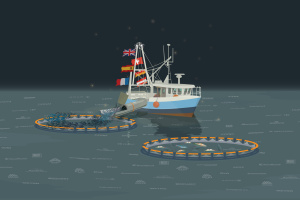Investing in troubled waters: the material risks of fish mortality and the use of wild-caught fish in feed for the aquaculture sector

Executive summary
Soaring consumer demand for seafood, coupled with the depletion of wild-fish stocks from overfishing, is often perceived as creating opportunities for the aquaculture sector, making it an attractive target for investment. The value of the global aquaculture market is projected to reach US$376 billion by 2025.
Between now and 2030, it is forecast that investment in aquaculture could range anywhere from $150 billion to $300 billion, according to a study by Encourage Capital and The Nature Conservancy. DNB, Nordea Bank and Rabobank are the top three lenders to aquaculture companies, with a total loan exposure of around €8 billion.
However, analysis shows the aquaculture industry is exposed to numerous risks relating to the use of wild-caught fish in feed and the high level of mortalities in aquaculture, which stem from poor fish welfare. Together, these issues present significant environmental, social and animal-welfare concerns. Investors should be at the forefront of addressing these risks with companies; such environmental, social and corporate governance (ESG) issues are likely to affect returns on investments.
Our research shows that, overall, very few investors are taking these material issues of fish mortality and wildcaught fish in aquaculture into account in their engagement with investees in the aquaculture supply chain. We sent a questionnaire to 23 investors and financial institutions, and the responses show they could be doing much more to require companies to rapidly address these two critical material challenges. The risks can be mitigated by investment in better farming practices that place fish welfare front and centre, and by eliminating the use of wild-caught fish for feed in aquaculture supply chains.
PARTNERS



You might also like...

Krill, Baby, Krill: The corporations profiting from plundering Antarctica
This report investigates the main culprits responsible for the plundering of the cornerstone of the Antarctic food web: krill. Much of the marine life in the Southern Ocean is either a direct predator of ...

Floundering Around: An assessment of where European retailers stand on the sourcing of farmed fish
This report offers a comparative review of 49 leading European supermarket chains’ policies on farmed fish. Based on extensive research it identifies leaders and laggards.

Caught Out: How UK retailers are tackling the use of wild fish in their aquaculture supply chains
This report scores the top 10 UK supermarkets to assess how effectively they are addressing the ocean sustainability implications of the farmed seafood they sell, which remains largely reliant on the use of ...